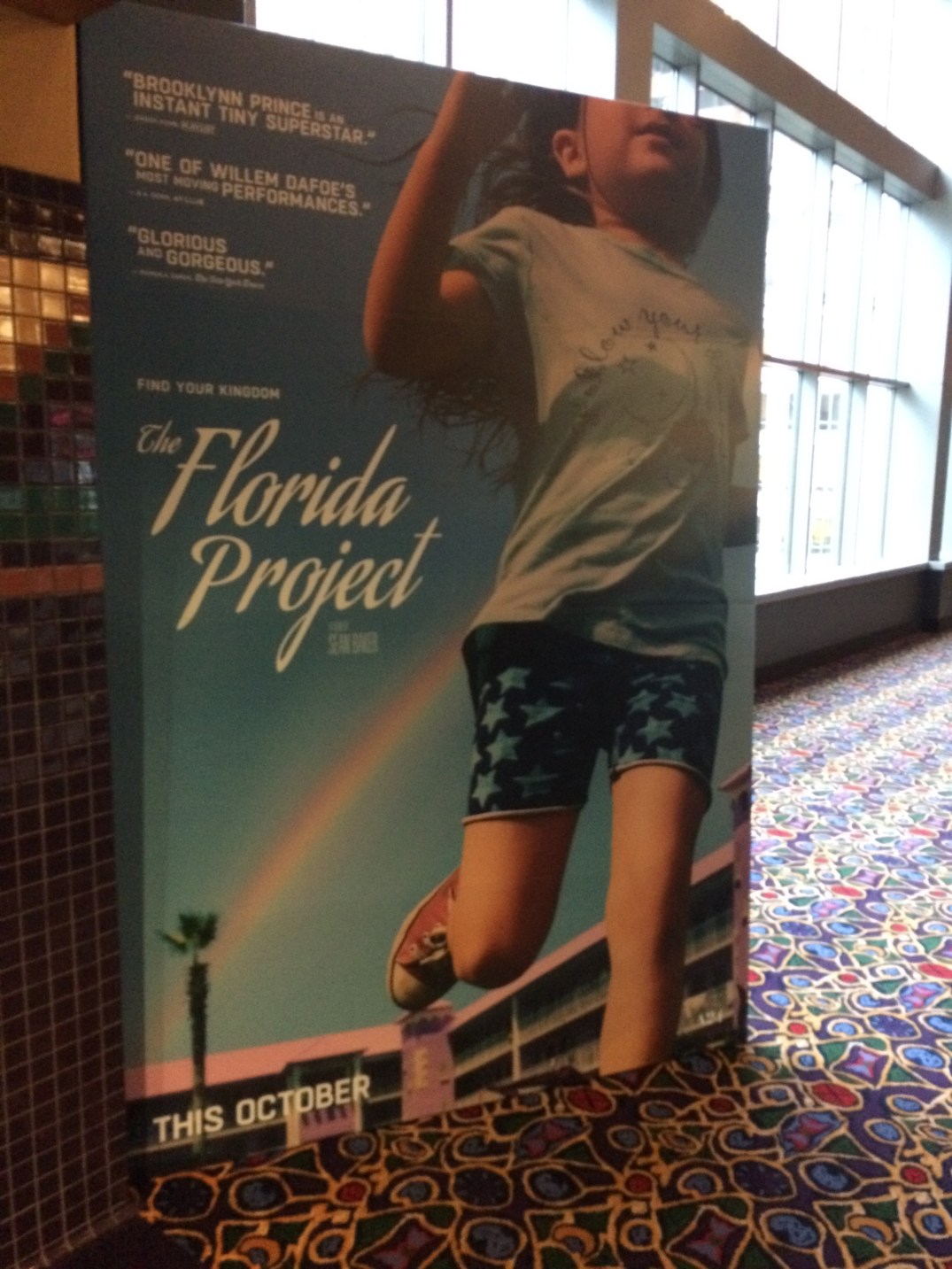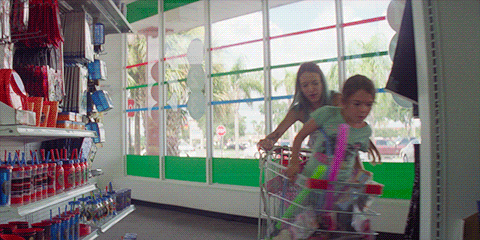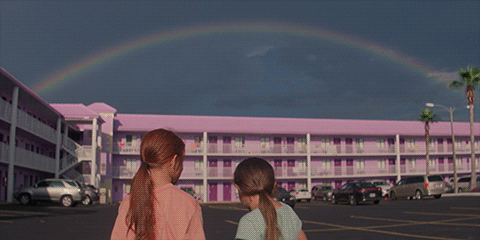It’s up to advocates to connect this story of family homelessness to action
By Katie Bradley, project assistant, Seattle University’s Project on Family Homelessness
As the credits for The Florida Project rolled, I was floored. This movie made me cry while I sat in the theater, and I didn’t even cry when I saw Titanic for the first time as a child. A movie about a family living in poverty at an Orlando budget motel got to me in the most heart-wrenching way.
I had just seen a raw portrait of family homelessness set in contrast with the happiest place on earth, Disney World. It made me want to do something to help families living like those depicted in the film. But I felt lost with what I could do, and it left me with my head spinning.
Fortunately for me, I work with a bunch of people who think about family homelessness all the time, and we think that we may be able to connect audiences to action, which we will explore later. First, here’s a description of this remarkable film and what it says about family homelessness.

The Florida Project is a breakout movie that depicts the struggles of living in poverty from a childhood perspective, set in a not-so-magical purple budget motel, the Magic Castle. The film depicts the often-unseen struggles of homelessness, which director and co-writer Sean Baker calls the “hidden homeless,” to represent the life of the modern-day “Little Rascals” who live a “life on the margins.”
A film that even my mom knows about
Because the film is making waves in the film industry and touches on a type of homelessness that very few people recognize, A24, the independent entertainment company promoting The Florida Project, has been hosting screenings to build support for the film at the housing advocate level.
I had the pleasure of attending the Seattle screening of The Florida Project Oct. 19, hosted by the Bill & Melinda Gates Foundation, supported by our SU Project on Family Homelessness, Housing Development Consortium, and the Washington Low Income Housing Alliance.

Before the screening, I researched the movie and found rave reviews about the dynamic plot and cast. It seemed like everyone was talking about it. Even my mom mentioned seeing it in featured in a magazine, so that’s when I realized that the movie had a far reach. With a Rotten Tomatoes score of “94% fresh,” my expectations for the film were set high.

As a project assistant with the Seattle University Project on Family Homelessness, I was intrigued to see how the film would portray the “hidden homelessness” that the children in the film experience. In fact, my fellow project assistant Madison Vucci and I had noted that Sean Baker had found the actress who played Halley (Bria Vinaite) on Instagram. Naturally, we checked out Vinaite’s Instagram account and that of the phenomenal young Brooklynn Prince, who at age 6 plays Moonee in the film.
We noted the well-off lifestyles the actresses lived before the film, and wondered how they would be able to relate to the struggle of family homelessness.

A brush with filmmakers
I arrived at AMC Pacific Place for the reception and screening excited to learn more about the issue and to finally see the movie for myself.

At the reception beforehand, I met homelessness advocates and was able to prepare myself for the emotional rollercoaster I was about to embark on. I met Sara’o Bery, the a24 Grassroots, Events & Brand representative for the film, and caught a glimpse of Sean Baker, the director and co-writer of the film. Meeting Sara’o and seeing Sean Baker is the closest I have ever been in my life to the people responsible for the making of a film, and it made me even more eager for what I was about to see on the big screen.


Sean Baker gave a brief introduction to the film and then the movie started to roll. I felt like I was instantly transported as I watched Moonee and her friend Scooty hock loogies at a car in the Florida heat. As the vivacious Moonee runs wild with a group of friends, the movie has a fast tempo with the children placed at the center of the film.

From scamming tourists for ice cream to treat their “asthma,” to bringing fish back to life in a chlorinated pool, to exploring an abandoned condo development, the escapades of Moonee and her friends are freeing and joyful. You can’t help but feel their childhood wonder as they go exploring throughout the Kissimmee, Fla. area.
Meanwhile, juxtaposed with the lack of supervision that allows for untamed exploration, lies a contrast to the childhood joy — with adults Halley and Bobby.

The fierce love of teen mom Halley for daughter Moonee is clear. Much like a grown-up child herself, Halley never misses an opportunity to have fun with Moonee. Yet, here is where the viewer might feel judgment start to creep in.
Questioning Halley as a mother, and other judgments
The lack of narrative for Halley’s past reduces the portrayal of the struggle to a personal failing. “She should be watching her daughter. She should just get a job like her friend. She shouldn’t use that language around children. If she were a better mother, her daughter would not be living like she is.” These are thoughts that easily start to creep in as you watch the unconventional mother-daughter relationship between Halley and Moonee.
Just when the film raised the question of parenting competence for me and probably others in the audience, I felt myself thanking the stars for a character like Bobby, the hotel manager played by Hollywood legend Willem Dafoe. Bobby watches over all of the children in the motel, which is shown quickly and fiercely in the scene in which an elderly creep starts hanging around the motel’s playground.
Bobby balances out Halley’s missteps as a mother in the film. This is where, from my perspective, the film strayed from storytelling and started stigmatizing the struggle of family homelessness.
As an audience member, you probably don’t walk away from the film liking the character of Halley. In fact, you may start to believe that she is inadequate, and even understand the need for Child Protective Services when they try to take Moonee away from her care. Yet, her devastation as a mother is palpable as she challenges, “You want me to help you take my child away? Are you serious?”

Halley is never given the grace of a background story, a tale of what led to her living in a motel as a single parent with a young daughter. The lack of a backstory is important because I believe that it can lead to a lack of compassion for the family’s struggle. Often, family homelessness is not a one-time experience; it can be generational. Children who were homeless with their families can have a hard time breaking the cycle, which causes many children to end up homeless as youth and/or adults.
Maybe this was Halley’s childhood; but we do not know her struggle, which could cause many audiences to simply cast her off as a “bad mother.”
Where to go next
I think the film did a great job showcasing the marginalized life of those experiencing “hidden homelessness” outside of the happiest place on earth. But, The Florida Project does not stand on its own in representing what we can do to help end family homelessness. I wish that the character of Halley were explored more in the film and that we learned how her background led her to this crossroads.

The end of the film leaves a lot to the imagination, which may be the point. You wonder what happens to Moonee, but in the pit of your stomach you know what happens. The film also leaves audiences wondering what they can do to help families experiencing homelessness.
During the post-film Q&A, moderated by our partner Reiny Cohen of Washington Low Income Housing Alliance, someone asked Baker what audiences could do next after being called to action by the film. He replied that he has partnered with one Florida organization, Community Hope Center, Hope 192, and was open to hearing what homelessness advocates had to add.
But that fell short for local audiences, and a quick audience Q&A wasn’t really the proper setting to develop a set of action steps. Still, that paves the way for advocates to help answer the question. (And I’ve noticed that in interviews since, Baker emphasizes local action much more. You can tell he really cares about this issue.)
After the event, I learned that I was not alone in feeling disappointed about what felt like a missed opportunity. My supervisor, Catherine, mentioned talking afterwards with our colleague Lisa Gustaveson, who said “What it needs is a discussion guide.” Lisa, as project manager of the Faith & Family Homelessness Project, had helped us develop several discussion guides that she used for dozens of film screenings with faith communities. These include the guides for American Refugees and the documentary features @home (about social media advocate Mark Horvath) and American Winter (the HBO film about homeless families calling 211 in Portland, Ore.)
I liked that idea and took a crack at developing a guide, based on those guides that our projects had produced previously. That led us to think more about how this film could serve as an advocacy tool. We’ve been talking to local partners and to the filmmakers about how to make that happen. We hope to share more in the next month or two.
UPDATE, March 2, 2018: We’re excited to report that this project has evolved and the Discussion Guide and Action Guide we created for the film are now available to share. Check out how you can use them to take action here.
What You Can Do
When audiences experience powerful emotion that impels them to want to act, we should prominently highlight some next steps and ways to help those families experiencing homelessness. Here are some next steps that I believe fit the movie and can help families like Halley and Moonee.
- Watch The Florida Project and talk about it with your friends, family, colleagues and others. A discussion guide like the one we created with our partners can frame your discussion through the lens of family homelessness.
- Share your thoughts about The Florida Project on social media. Use the hashtag #TheFloridaProject. Tag and follow @FloridaProject and @A24 on Twitter, @TheFloridaProject on Facebook and @thefloridaproject on Instagram.
- Watch other movies about family homelessness like SU’s “American Refugees” or The Florida Project‘s documentary predecessor, “Homeless: The Motel Kids of Orange County” on HBO.
- Check out our list of 10 things you can do to help end family homelessness. While it is designed for the Seattle area, many steps can be localized to your community.
- Use our advocacy tools, created with local partners: An Action Guide that directs you to solutions and a Discussion Guide you can use to share meaningful conversation.
- Tell your friends to watch The Florida Project via streaming platforms or on DVD or Blu-ray. We’re not the only ones who hold it in high regard; it has picked up some impressive honors over the past few months. See below…
THE FLORIDA PROJECT HONORS:
In addition to being named to numerous Top 10 lists and being named the best film of the year by many critics, The Florida Project was nominated for significant industry awards.
In chronological order…
Gotham Awards: Nominated for four awards — Best Feature, Best Director (Sean Baker), Best Actor (Willem Dafoe), Best Breakthrough Actor (Brooklynn Prince). Ceremony was Nov. 27, 2017.
National Board of Review: Two honors. The Florida Project was named one of the Top 10 Films of 2017. Willem Dafoe was named Best Supporting Actor. Announced Nov. 28, 2017. Gala was Jan. 9, 2018.
New York Film Critics Circle: Two honors. Sean Baker was named Best Director and Willem Dafoe is Best Supporting Actor. Announced Nov. 30, 2017. Ceremony was Jan. 3, 2018.
Los Angeles Film Critics Awards: Two honors. Willem Dafoe was named Best Supporting Actor; the film was named runner-up for Best Picture. Announced Dec. 3, 2017.
San Francisco Film Critics Circle: Two honors. The Florida Project was named Best Picture and Willem Dafoe was named Best Supporting Actor. Announced Dec. 10, 2017.
National Society of Film Critics: Willem Dafoe was named Best Supporting Actor. The film also earned a nod for Best Cinematography. Announced Jan. 6, 2018.
Golden Globe Awards: Nomination for Willem Dafoe as Best Supporting Actor, announced Dec. 11, 2017. Winners were announced at the ceremony Sunday, Jan. 7, 2018.
Critics Choice Awards: Brooklynn Prince won for Best Young Actor/Actress at the ceremony Jan. 11. See her beautiful acceptance speech here. The film was nominated for two other awards — Best Picture and Best Supporting Actor for Willem Dafoe.
Screen Actors Guild Awards: Willem Dafoe was nominated for Best Supporting Actor. Nominations were announced Dec. 13, 2017. Winners were announced at the ceremony Sunday night, Jan. 21, 2018.
British Academy of Film and Television Arts (BAFTA) Awards: Willem Dafoe was nominated for Best Supporting Actor. Nominations were announced Jan. 9, 2018. Winners were announced at the ceremony Sunday night, Feb. 18, 9 p.m. (London time).
Independent Spirit Awards: Nominated for two awards — Best Feature and Best Director (Sean Baker). Nominations were announced Nov. 21, 2017. Winners were announced at the ceremony Saturday afternoon, March 3, 2018, live on IFC.
Academy Awards: Willem Dafoe was nominated for Best Supporting Actor. Nominations were announced Jan. 23, 2018. Winners were announced at the ceremony Sunday night, March 4, 2018, live on ABC.
Congratulations on all these nominations and awards!


I really liked this movie, as unorthodox as it was. The first hour was uproariously funny, before becoming a deep, and poignant study of the millions of lives of Americans who are living on the fringes of society, just barely surviving day to day. There is a shocking lack of cinema devoted to this underclass, and seeing this small film, was refreshing, enlightening, and surprising, and a refreshing contrast to the plutocracy we see all around us today.
Pingback: Happy Hellos and Hard Goodbyes, 2018 Edition – Part One
Pingback: Top 10* Films of the Decade — About Homelessness